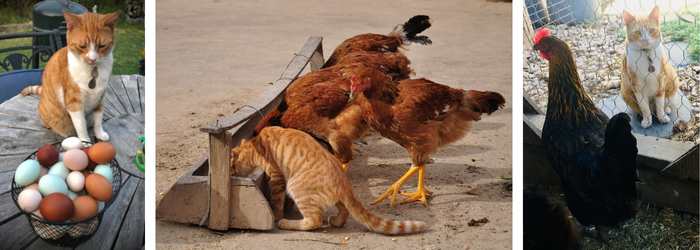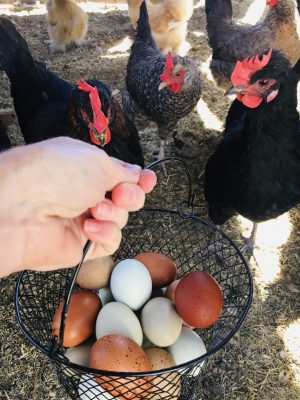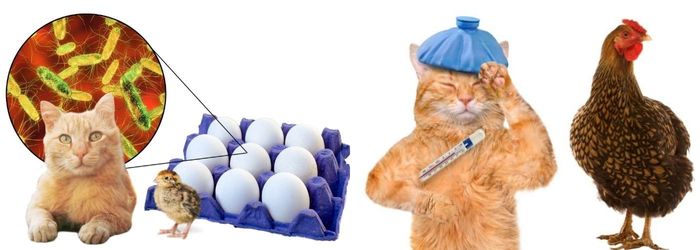
Can cats get sick from chickens? Cats can contract diseases from chickens, but are only likely to get sick if they are immunocompromised. There are 5 serious illnesses that cats can contract from infected chickens.
This article will key you in on how cats can become ill with these 5 potentially deadly diseases, symptoms to look out for as well as prevention tips.
So, “What illnesses can a cat get from a chicken?”
- How to Help Prevent Cats from Getting Sick from Chickens
- 1. Can Cats Get Salmonella from Chickens?
- 2. Can Cats Get E.coli from Chickens?
- 3. Can Cats Get Worms from Chickens?
- 4. Can Cats Get Ringworm from Chickens?
- 5. Can Cats Get Campylobacter from Chickens?
- CONCLUSION: Can Cats Get Sick from Chickens? 5 Serious Illnesses
How to Help Prevent Cats from Getting Sick from Chickens
- keep your cat up to date on vaccines,
- routinely worm your flock
- keep on a good coop cleaning schedule
- provide both cats and chickens with a nutritionally balanced diet
Just because a cat may contract a potentially harmful bacteria from a chicken does not mean that they will become ill. Healthy cats are usually able to keep the harmful bacteria under control and may never show symptoms in their lifetime. Immunocompromised cats are more likely to fall ill (and so are chickens).
What Can Cause a Chicken or Cat to Become Immunocompromised?
- having other underlying diseases
- unsanitary living conditions
- crowded living conditions
- infestation of parasites; mites, lice, fleas, ticks
- lack of food and water
- not being provided with nutritionally balanced food
- bullying by other flock members(for chickens)
1. Can Cats Get Salmonella from Chickens?
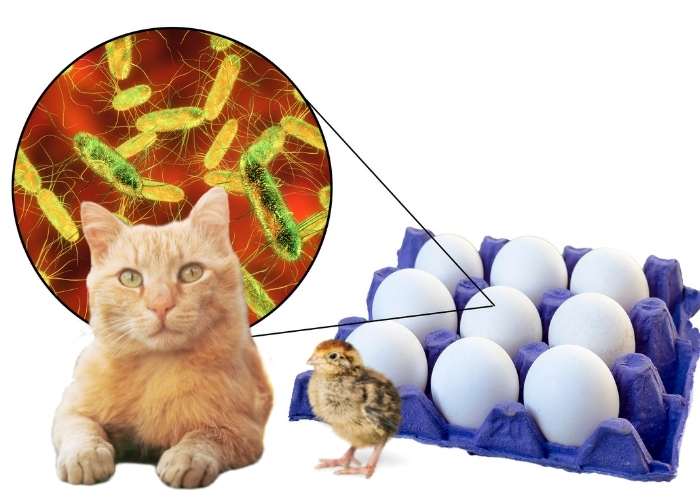
Yes, cats can get salmonella from infected chickens and chickens can get it from cats too! Both can pass it to humans.
This is especially important to know if you own a cat and allow them to mingle with your chickens and also allow them to come inside your home.
Salmonella is a bacteria that causes inflammation in the gut and in serious cases it can cause blood poisoning. Salmonella can be contracted in many different ways.
How do Cats Get Salmonella from Chickens?
- eating raw or undercooked chicken meat
- eating raw or undercooked chicken eggs
- eating feces contaminated with salmonella
- coming into contact with contaminated feces in the environment
Symptoms of Salmonella in Cats
- mucous in stool
- watery diarrhea
- lethargy
- vomiting
- anorexia
- not wanting to eat
- withdrawn
- sleeping more than usual
- fever
- rapid heart rate
- skin disease
- inflammation of the lymph nodes
2. Can Cats Get E.coli from Chickens?
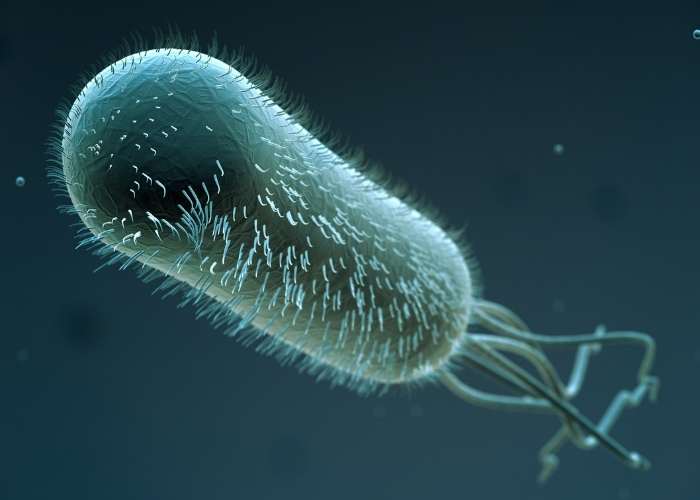
E. coli is an abbreviation for Escherichia coli and is a bacteria that is found in our environment and in particular foods (such as raw or undercooked chicken meat). It is also found in the guts of people and many animals, including cats and chickens.
Most E. coli is harmless, but there are some strains that are harmful.
All chickens and cats carry E.coli in their gut, but usually do not show any signs of an infection. In a healthy environment, the normal gut flora will keep the E.coli under control. If a chicken or cat is immunocompromised, this bacteria can get out of control and pass in larger quantities in the feces.
How do Cats Get E.coli from Chickens?
- eating raw or undercooked chicken meat
- eating raw or undercooked chicken eggs
- eating feces contaminated with E. coli
- coming into contact with contaminated feces in the environment
Both a cat and chicken can become ill by eating each others contaminated feces, especially if they are immunocompromised.
A cat can also become ill if it eats contaminated chicken meat or eating undercooked chicken meat and eggs that are contaminated with E.coli.
Symptoms of E. coli Illness in Cats
- bloody or watery diarrhea
- vomiting
- dehydration
- withdrawn
- weakness
- stops eating
- rapid heart rate
- dehydration
3. Can Cats Get Worms from Chickens?

There are 5 different types of worms that are more commonly seen in chickens that can be passed to cats.
- Tapeworms-look like a grain of rice; seen in chicken intestines, eggs, feces
- Roundworms-look like spaghetti noodles; seen in chicken intestines, eggs, feces
- Hookworms-2-3 mm long, barely visible by the human eye; attach themselves with hooklike mouth to lining of intestines, excreted in the feces
- Gapeworms-tiny, bright red worm that are Y shaped in appearance; commonly found in mouth of chickens
- Thread of Capillary Worms-1 cm long, thread like worms, eggs can only be seen under a microscope; seen in chicken crop, esophagus and lining of the intestines
How do Cats Get Worms from Chickens?
- eating raw or undercooked chicken meat
- eating raw or undercooked chicken eggs
- eating feces contaminated with worms
- coming into contact with contaminated feces in the environment
Symptoms of Worms in Cats
- vomiting
- worms in vomit
- bloody diarrhea
- diarrhea without blood
- loss of weight
- eating more than usual
- eating less than usual
- withdrawn
- depressed
- tarry poop
- rice looking grains around fur at its bottom
- worms in poop
- coat lacks luster
- skin lesions
4. Can Cats Get Ringworm from Chickens?
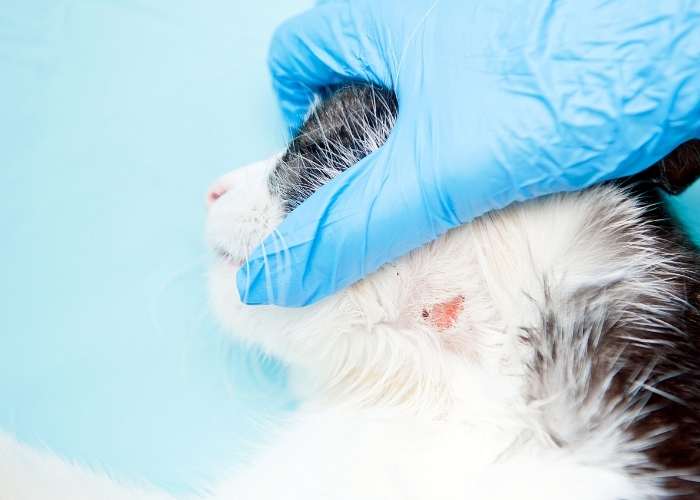
Ringworm is not caused by a worm. Ringworm is a skin infection caused by a fungus, Lophophyton gallinae. It prefers spreading among animals, but can also be spread to humans.
How do Cats Get Ringworm from Chickens?
- eating chicken poop
- laying on the chicken coop floor
- touching surfaces in the chicken coop that ringworm is present
- rubbing against chickens infected with ringworm
Symptoms of Ringworm in Cats
- bald, circular patches of hair loss
- crusty skin where there is hair loss
- skin inflamed looking
- thickening of affected skin
- cat grooms more than usual
- infection seen around claws
- dandruff
- lesions most common on the head, front legs, spine and chest
- lesions can get itchy if infection sets in
- distortion of nails (from infection)
5. Can Cats Get Campylobacter from Chickens?
Campylobacter is a bacterial disease. It can be passed from chickens to cats, cats to chickens and can also be passed to humans from animals.
It quietly lives in the intestines of animals(such as chickens and cats) and only becomes a problem if the bacteria is passed on to humans.
It is important to know this, especially if you own a cat that is allowed to mingle with the chickens and then come indoors.
How do Cats Get Campylobacter from Chickens?
- eating raw or undercooked chicken meat
- drinking the drippings from infected raw chicken meat
- eating raw or undercooked chicken eggs
- eating feces contaminated with Campylobacter
- coming into contact with contaminated feces in the environment
Symptoms of Campylobacter in Humans

Symptoms usually will begin 2-5 days after ingesting the bacteria.
- abdominal cramping
- bloody diarrhea
- vomiting
- nausea
- fever
“In people with weakened immune systems, such as those with a blood disorder, with AIDS, or receiving chemotherapy, Campylobacter occasionally spreads to the bloodstream and causes a life-threatening infection.”
CDC
CONCLUSION: Can Cats Get Sick from Chickens? 5 Serious Illnesses
The best way to keep your cats, chickens and yourself healthy is to:
- keep your cats up to date with vaccinations
- routinely worm your flock
- keep on a good chicken coop cleaning schedule
- provide nutritionally balanced food for your cats and chickens
5 Common Illnesses that Can be Passed to Your Cats from Chickens
- Salmonella
- E.coli
- Worms
- Ringworm
- Campylobacter

